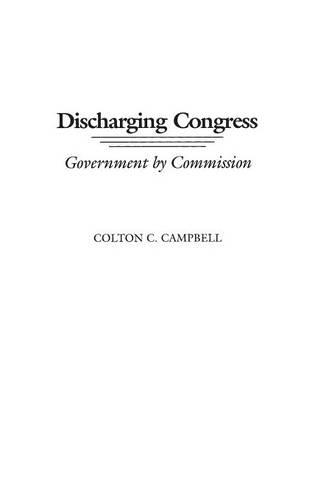
Discharging Congress: Government by Commission
(Hardback)
Publishing Details
Discharging Congress: Government by Commission
By (Author) Colton C. Campbell
Bloomsbury Publishing PLC
Praeger Publishers Inc
30th November 2001
United States
Classifications
Tertiary Education
Non Fiction
Central / national / federal government
352.7430973
Physical Properties
Hardback
216
Description
Advisory commions have become a crucial part of the American legislative way of life, yet the relevant literature is both sparse and unsatisfying. Campbell not only supplies useful information about important cases, but also provides a framework for understanding congressional delegation to commissions. He transcends the common focus on the reelection motive to examine information needs and workload considerations as a motivation for legislative behavior.
Reviews
This study of congressional commissions seeks to answer questions about this use (some would say abuse) of the legislative process. Campbell surveys the history of congressional commissions, explains why Congress would voluntarily render up some of its power, and provides case studies of several congressional commissions. Essentially, Campbell notes that Congress has turned to creating a commission when (1) the issues are large and complex, and members of Congress lack the necessary expertise; (2) the congressional workload prevents the institution and its members from being able to efficiently do their jobs because of pressures of time, information, and volume; (3) the institution seeks to avoid, or at least to share, blame. Some issues (military base closings come to mind) are so sensitive that members would just as soon not be held responsible for making the difficult decisions. Members whose electoral fortunes rest on the home folks seldom prefer the collective good. Some critics of Congress have argued that the institution creates far too many commissions and deeds far too much decision-making power to these extralegal institutions. This study equips academics and citizens to make their own judgment on these commissions. The case studies are particularly interesting and illustrative. Recommended for general readers through graduate students.-CHOICE
"This study of congressional commissions seeks to answer questions about this use (some would say abuse) of the legislative process. Campbell surveys the history of congressional commissions, explains why Congress would voluntarily render up some of its power, and provides case studies of several congressional commissions. Essentially, Campbell notes that Congress has turned to creating a commission when (1) the issues are large and complex, and members of Congress lack the necessary expertise; (2) the congressional workload prevents the institution and its members from being able to efficiently do their jobs because of pressures of time, information, and volume; (3) the institution seeks to avoid, or at least to share, blame. Some issues (military base closings come to mind) are so sensitive that members would just as soon not be held responsible for making the difficult decisions. Members whose electoral fortunes rest on the home folks seldom prefer the collective good. Some critics of Congress have argued that the institution creates far too many commissions and deeds far too much decision-making power to these extralegal institutions. This study equips academics and citizens to make their own judgment on these commissions. The case studies are particularly interesting and illustrative. Recommended for general readers through graduate students."-CHOICE
Author Bio
COLTON C. CAMPBELL is Assistant Professor of Political Science, Florida International University. Professor Campbell has co-edited five earlier books on Congressional politics and practices.
